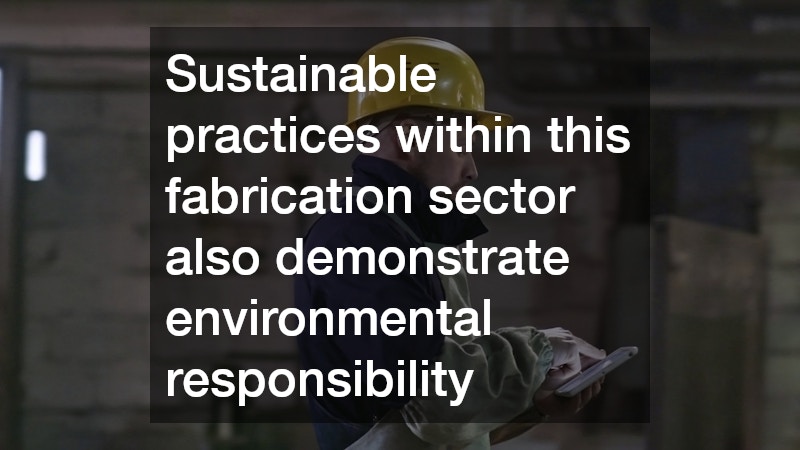Sheet metal fabrication plays a crucial role in many industries across Australia. From construction to manufacturing, this process offers numerous advantages that can enhance your business operations and product quality.
Understanding the key benefits of this service can help you make informed decisions and stay competitive in a fast-paced market.
Precision & Consistency in Production
One of the primary benefits of this process is the precision it offers. Advanced machinery and skilled technicians ensure components are produced accurately to exact specifications. This precision minimises errors and reduces waste, which ultimately lowers production costs.
Consistency is another vital factor. The process allows for the mass production of identical parts without sacrificing quality. This consistency improves the reliability of finished products, which can enhance your brand’s reputation and customer satisfaction.
By using this fabrication technique, businesses can achieve uniformity in their product lines, which is especially important for industries requiring high standards, such as automotive and aerospace manufacturing.
Cost-Effective Solutions & Material Efficiency
Investing in metal fabrication can lead to significant cost savings. The process optimises material use, reducing scrap and waste. By carefully planning cuts and bends, fabricators maximise the use of raw materials, ensuring minimal excess.
Moreover, the fabrication process often reduces labour costs. Automation and computer-controlled equipment speed up production and lessen the need for manual intervention. This not only shortens lead times but also decreases the likelihood of human error.
In the long run, the efficiency of this method means businesses can offer competitive pricing without compromising on quality. Cost-effective production methods can boost profit margins and open up new market opportunities.
Flexibility & Customisation for Unique Needs
Another major advantage is the flexibility of the fabrication process. Whether your business needs simple components or complex assemblies, it can accommodate a wide range of designs and specifications.
Customisation options allow you to tailor products exactly to your requirements. You can select different metals, thicknesses, finishes and shapes to suit your project. This adaptability makes this approach ideal for industries where unique or specialised parts are essential.
Additionally, the process supports rapid prototyping and small batch production, enabling businesses to test new ideas or cater to niche markets without large upfront investments.
Strength & Durability for Long-Lasting Results
Sheet metal components are known for their strength and durability. Metals like steel, aluminium and copper offer robust resistance to wear and tear, corrosion and impact, making fabricated parts suitable for demanding applications across various industries.
Using these fabrication techniques means your business can produce products designed to last. This durability translates to fewer repairs, less downtime and longer service life, which benefits both manufacturers and end-users by improving overall reliability and reducing maintenance costs.
For businesses focused on quality, offering durable products can differentiate you from competitors, build customer loyalty and enhance your reputation in the market.
Improved Safety & Compliance Standards
Safety is a critical consideration for any business. Quality fabrication processes often include strict controls and adhere to industry standards, ensuring products meet regulatory requirements.
Using well-constructed metal parts designed and produced to exact standards can enhance workplace safety. For example, components in machinery that are manufactured precisely reduce the risk of failure and accidents.
Furthermore, compliance with Australian regulations and standards helps avoid costly fines or legal issues. Businesses can operate with greater confidence knowing their products are safe and meet required guidelines.
Environmentally Friendly Practices & Sustainability
Sustainability is becoming increasingly important for businesses in Australia. Efficient metal fabrication supports eco-friendly practices through effective use of materials and extensive recycling opportunities.
Fabricators often recycle metal scraps and offcuts, significantly reducing landfill waste and minimising environmental impact. The process also encourages the use of recyclable materials and energy-efficient production methods, which align with environmental goals and corporate responsibility.
By choosing these fabrication services, businesses can actively contribute to sustainability initiatives, reduce their carbon footprint and appeal to environmentally conscious customers.
Streamlined Supply Chains & Faster Turnaround
Efficient supply chains are vital to business success. Reliable fabrication methods can help streamline production schedules and improve turnaround times.
With advanced planning and automation, fabricators can deliver components quickly and reliably. This speed is essential in industries where timely delivery impacts overall project completion.
Streamlined processes also allow for better inventory management, reducing storage costs and minimising delays caused by waiting for parts.
Sheet metal fabrication offers many advantages for businesses across various industries in Australia. From precision and consistency to cost savings and flexibility, this process supports efficient, high-quality production.
The durability and strength of fabricated components provide long-lasting solutions that enhance product value. At the same time, adherence to safety and compliance standards protects your business and workforce.
Sustainable practices within this fabrication sector also demonstrate environmental responsibility, an increasingly important factor for modern businesses.
By integrating sheet metal fabrication into your operations, you position your business for improved efficiency, reduced costs and stronger competitiveness. Understanding these benefits is the first step toward harnessing the full potential of this essential manufacturing process.




